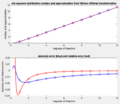Chi-square distribution facts for kids
The chi-square distribution (pronounced "kai-square") is a special idea in statistics, which is the study of data and chance. It's like a mathematical tool that helps us understand how likely certain things are to happen.
Contents
What is the Chi-Square Distribution?
Imagine you're flipping a coin many times. You expect about half heads and half tails. But what if you get a lot more heads than tails? The chi-square distribution helps us figure out if that difference is just random luck or if something else is going on. It's a way to compare what we expect to happen with what actually happens.
Why is it Useful?
This distribution is super helpful in many areas, especially when scientists or researchers want to test ideas. It helps them decide if their results are meaningful or just by chance. For example, if a new medicine seems to work better, the chi-square distribution can help check if the improvement is real.
When Do We Use It?
We often use the chi-square distribution in something called "statistical significance tests." This means we are testing if a result is "significant," or important enough to notice. It helps us see if patterns in data are real or just random.
For instance, it can be used to:
- See if two things are related (like if eating breakfast affects your grades).
- Check if observed results match what we expected (like the coin flip example).
- Test if different groups are similar or different in some way.
Important Conditions
For the chi-square distribution to work correctly, a few things need to be true:
- No real effect: We often start by assuming there's no real difference or relationship. This is called the "null hypothesis." The chi-square test helps us see if we have enough evidence to say this assumption is wrong.
- Independent data: Each piece of information or observation must be separate from the others. For example, one person's answer in a survey shouldn't affect another person's answer.
Images for kids
See also
 In Spanish: Distribución χ² para niños
In Spanish: Distribución χ² para niños
 | Audre Lorde |
 | John Berry Meachum |
 | Ferdinand Lee Barnett |


